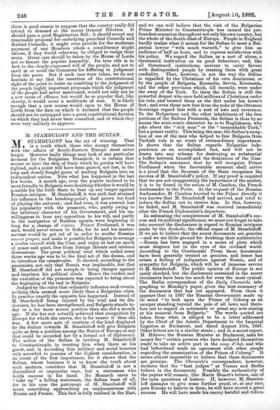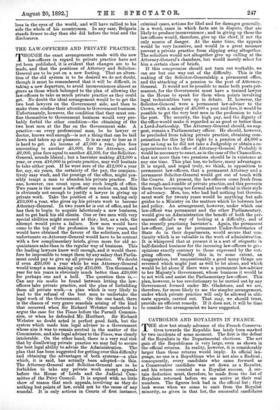M. STAMBULOFF AND THE SULTAN.
MSTAILBULOFF has the art of winning. That • is a truth which those who occupy themselves with the affairs of South-Eastern Europe must never forget. However badly things may look at any particular moment for the Bulgarian Bismarck, it is certain that sooner or later the ship of State which he guides will have righted, and a point will have been gained, not lost, in the long and closely-fought game of making Bulgaria into an independent nation. Note what has happened in the last few weeks. A month ago, even the papers inclined to be most friendly to Bulgaria were doubting whether it would be possible for the little State to bear up any longer against Russian intrigue. M. Stambuloff, it was said, had strained his influence to the breaking-point; had grown too fond of playing the autocrat ; and had even, it was averred, lost ills popularity with the peasants, who, partly owing to the arbitrary character of his Government, and his un- willingness to bear any opposition to his will, and partly to the instigation of Russian agents, were beginning to long for a change of regime. Prince Ferdinand, it was said, would never return to Sofia, for he and his master- servant would be got rid of in order to soothe Russian amour propre, and make it possible for Bulgaria to arrange a modus vivendi with the Czar, and enjoy at last an epoch of peace and quiet, free from foreign threats and internal dissensions. The great political trial which ended some three weeks ago was to be the final act of the drama, and to introduce the catastrophe. It showed, according to the pessimists, not only that Russia was implacable, but that M. Stambuloff did not scruple to bring charges against and imprison his political rivals. Hence the verdict and the execution of the prisoners was expected to bring about the beginning of the end in Bulgaria. . Judged by the rules that ordinarily influence such events, nothing then seemed more likely than a Bulgarian crisis. In practice exactly the opposite has happened. Instead of M. Stambuloff being injured by the trial and its dis- closures, he has been strengthened, and Bulgaria stands to- day in a far more secure position than she did a month ,ago. If she has not actually achieved that recognition by ,Europe for which she craves, she is far nearer it than she was. A few more acts of courtesy of the kind displayed by the Sultan towards M. Stambuloff will give Bulgaria quite as firm a position among the States of Europe as any that could be accorded her by a formal act of diplomacy. The action of the Sultan in inviting M. Stambuloff to Constantinople, in treating him when there as his guest, and in according him military and social honours only accorded to persons of the highest consideration, is an event of the first importance, for it shows that the Sultan, whose business it is to know the truth about such matters, considers that M. Stambuloff is not a discredited or unpopular man, but a statesman who holds success in his hand. No Monarch cares to "take up" a falling statesman, the Sultan least of all, for in his case the patronage of M. Stambuloff will mean something approaching an unpleasantness with Russia and France. This fact is fully realised in the East, and we can well believe that the visit of the Bulgarian Prime Minister to Constantinople has caused the pro- foundest sensation throughout not only his own country, but the whole of the South-East of Europe. People in England hardly realise what it means for the Sultan to meet a Bul- garian lawyer "with much warmth," to give him an audience of half an hour, and to express satisfaction with his policy. We regard the Sultan as a sort of abuse, a threatened institution on its good behaviour, and, like all threatened institutions, anxious to curry favour with distinguished people by treating them with great cordiality. That, however, is not the way the Sultan is regarded by the Christians of his own dominions, or by the people of Bulgaria, Ronmelia, Servia, Roumania, and the other provinces which, till recently, were under the sway of the Turk. To them the Sultan is still the powerful despot who once held millions of Christians under his rule, and treated them as the dirt under his horse's feet; and even those now free from the yoke of the Ottoman Sovereign regard him with a sort of awe and reverence. To the Bulgarians and the other inhabitants of the free portions of the Balkan Peninsula, the Sultan is thus by no means the semi-comic character he is to Englishmen, who joke about the "sick man" or the "unspeakable Turk," but a potent reality. This being the ease, the Sultan's recep- tion of one of the men who helped to free Bulgaria from Turkish rule is an event of extraordinary importance. It shows that the Sultan regards Bulgarian inde- pendence as an accomplished feet, and will not be drawn into any scheme for destroying so substantial a buffer between himself and the dominions of the Czar. The Sultan's assurance that he will recognise Prince Ferdinand when the favourable moment shall arrive is a proof that the Suzerain of the State recognises the success of M. Stambuloff's policy. If any proof is required that we are not exaggerating the importance of the matter, it is to be found in the action of M. Cambon, the French Ambassador to the Porte. At the request of the Russian Ambassador, M. Cambon hurried to the Palace directly it was known that M. Stambuloff had arrived, and tried to induce the Sultan not to receive him. In this, however, he failed, and M. Stambuloff was received immediately after the French Diplomatist's departure. In estimating the completeness of M. Stambuloff's suc- cess and its political significance, we must not forget to take into account the disclosures in regard to Russian intrigues made by the Svoboda, the official organ of M. Stambuloff. If we are to believe that the secret documents are genuine —and we see little ground for doubting their authenticity —Russia has been engaged in a series of plots which must disgrace her in the eyes of the civilised world. According to the Continental Press, these documents have been generally treated as genuine, and hence has arisen a feeling of indignation against Russia, and of sympathy for Bulgaria, which will be of immense service to M. Stambuloff. The public opinion of Europe is not easily shocked, but the disclosures contained in the secret documents have been too much for even the most cynical. The Berlin correspondent of the Daily Chronicle, tele- graphing to Monday's paper, gives the best summary of the documents that has yet appeared. From them it appears that in 1887 the Russian Government made up its mind "to look upon the Prince of Coburg as an usurper standing beyond the pale of all laws, and there- fore not to regard as actionable or penal any acts aiming at his removal from Bulgaria." The words quoted are taken from what is alleged to be a letter addressed by the Chief of the Asiatic Department to the Imperial -Legation at Bucharest, and dated August 10th, 1887. Other letters are in a similar strain ; and in a secret report, M. Hitrovo, the Russian Minister at Bucharest, asks for money for "certain persons who have declared themselves ready to take an active part in the coup d'clat, and who had beforehand made an agreement with other people regarding the assassination of the Prince of Coburg." It seems almost impossible to believe that these documents are genuine. The Chronicle's correspondent, however, declares that the "best judges" at Vienna and Berlin believe in the documents. Possibly the authenticity of the papers will remain, like Marie Stuart's letters, one of the open questions of history. If, however, M..Stambu- loft manages to give some further proof, or, at any rate, gets Europe to believe in them, he will have scored a great success. He will have made his enemy hateful and ridicu- lona in the eyes of the world, and will have rallied to his side the whole of his countrymen. In any case, Bulgaria stands firmer to-day than she did before the trial and the disclosures.



































 Previous page
Previous page